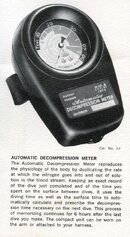I'm an old timer, certified in 1970, Navy tables, by the LACUU
<snip>
I have no problem with modern technology, I've been diving computers since 1999.
Let's not forget that many of the well-known divers of the 1960s through the 1980s also used decompression computers. Granted they were analog but did credit for multi-level dives.





